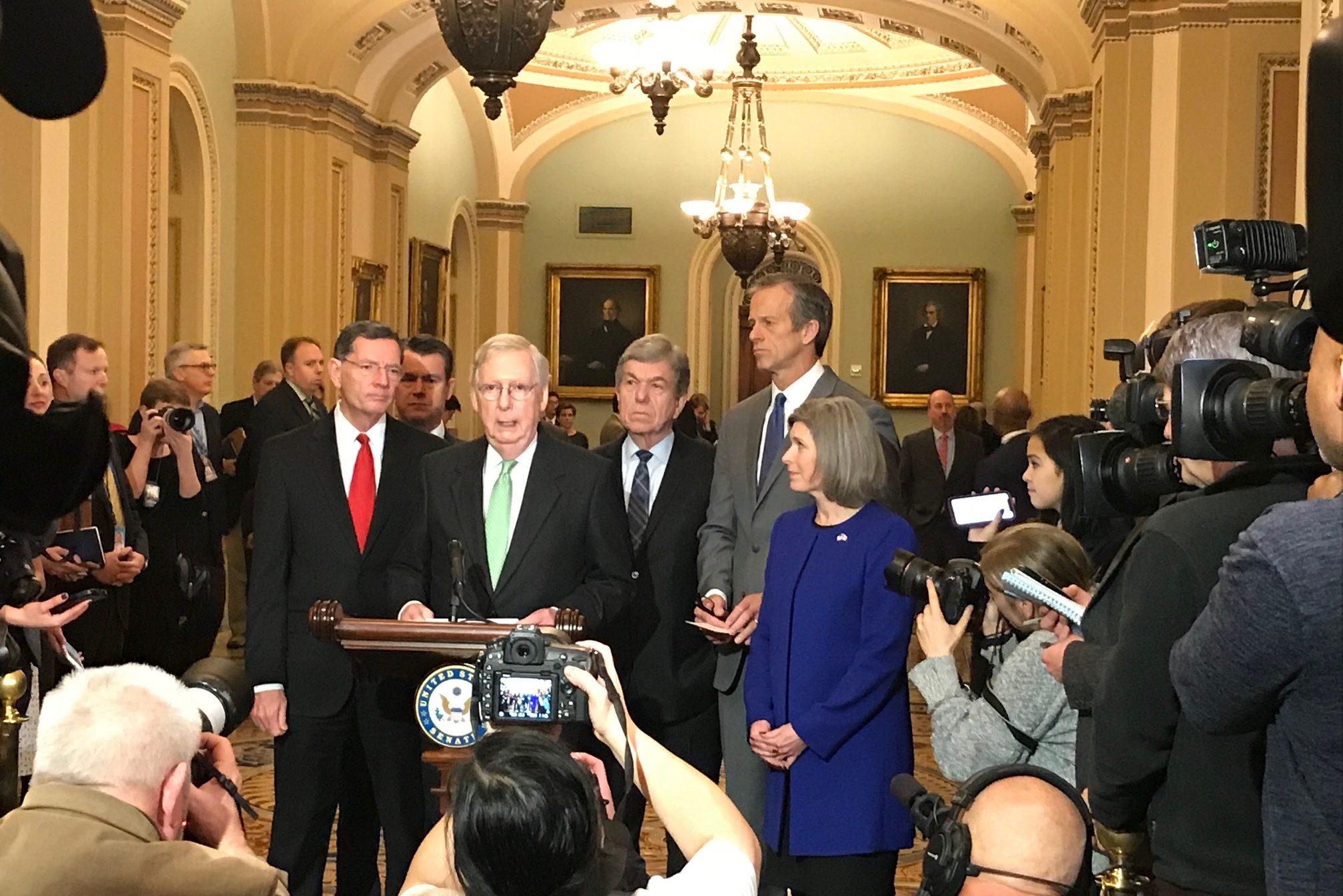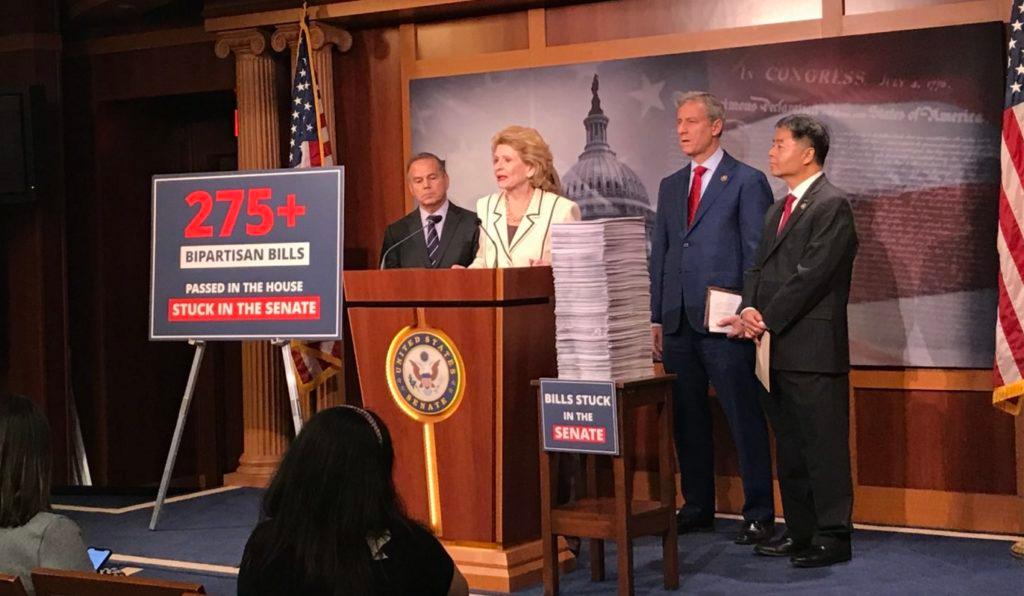
Congress ended their 2019 work on a sweet and sour note.
Instead of an early break, lawmakers stayed in Washington, D.C. and passed must-pass legislation. But several bills, including a Colorado public lands package, remain in limbo.
Much of the blame has been focused on the Senate and its current leader, Republican Sen. Mitch McConnell. But that’s not how he sees it.
“I think we’re ending on a pretty good note here in spite of all the challenges swirling around both the House and Senate these days,” McConnell said.
That’s not the assessment many Democrats would give.
“Really, the Majority leader should be ashamed. Really should be,” said Democratic Sen. Joe Manchin of West Virginia. “I mean you can’t go out and face the public and say we’ve done a heck of a job. If your job was to stop everything, you get an A+.”
Manchin’s expressing the frustration many on the other side of the aisle feel, including some Republicans, about the trickle of legislation that has made its way through the Senate.
A number of bills that passed the Democrat-controlled House — including gun violence prevention measures, bills to lower the cost of health care or prescription drugs, the Violence Against Women Act, just to name a few — have not been brought to the floor of the Senate for debate. Instead, they have languished in what Colorado Sen. Michael Bennet has called McConnell’s legislative graveyard.
“If you accept the rubble of our current institutions as McConnell and [President] Trump can do, the reason they can accept that rubble is that they're not actually trying to solve anything like climate or even past an infrastructure bill,” Bennet told Colorado Matters in early December. “If all you want to do is put right-wing judges on the courts and cut taxes occasionally for rich people, you can do it in the midst of this rubble.”
Reshaping the country’s judiciary has been McConnell’s priority.
“Most of the time of the floor of the Senate has been devoted towards nominations. And that’s been the choice of Mitch McConnell, the Republican leader,” said Sen. Ben Cardin of Maryland.
Before passing the appropriations bills, McConnell moved on 13 nominations. There have been weeks throughout the year where all the Senate did was vote on confirmations and nominations.
As many Republicans will tell you, it’s the prerogative of the majority leader to set the agenda — not the minority party. Instead, they lay blame for the lack of legislation at the feet of the Democrats, who they say have obstructed the legislative process in the Senate.
“It would have been nice to have finished a lot of these bills individually earlier in the year, which we tried to do and the democrats consistently blocked and objected to that,” Republican Sen. John Thune said.
The Senate has protections for its minority members — through its rules, filibusters and rights to debate. That’s why it’s harder to move legislation forward in that chamber unless there is agreement.
“So you have a minority perceive in their interest to delay that process and obstruct that as much as possible,” said Michael Thorning Associate Director the Bipartisan Policy Center’s Governance Program. “And the majority party, once they get started in that process, is basically stuck in that situation until they pull the bill or they’ve worked through that amount of time.”

Thorning says the number of bills the Senate looks at in a year can range from 175 to 400. The 2019 Senate has operated on the lower end of that range, as it has for the last few years. The chamber also hasn’t debated many amendments this year — this is where senators really get to participate in the legislative process. Thorning said it’s the second-lowest in recent history. This is a process that is controlled by McConnell, who has a reason to proceed cautiously.
“Likely, what he’s doing is protecting his members from having to take tough votes on what may be controversial issues offered by the minority,” Thorning explained.
After all, another priority for McConnell is protecting vulnerable Republicans, like Colorado’s Cory Gardner and the Senate majority in 2020.
What is interesting, Thorning said, is that when Democrat Harry Reid was majority leader in 2015 he was accused of the same foot-dragging as McConnell has been. Reid lost the Democratic majority in 2016.
Gardner didn’t give an opinion on the pace of legislation when asked. He did share the major bills passed this year that he felt would benefit Coloradans like the permanent reauthorization of the Land And Water Conservation Fund and repeals of the health insurance tax and medical device tax included in the year-end spending package.
“As we head into the next year, I feel honored to represent the greatest state in the country and I will continue to fight every day for what’s right for Colorado,” Gardner said in a statement.
Dozens of smaller bills that impact Colorado have passed — fighting robocalls and election security — but the Senate hasn’t tackled major issues like the House has. That’s because as Rep. Senator Richard Shelby of Alabama notes, the Senate is the more deliberative body.
“The Senate was created to put a brake on what the House does,” Shelby said.
Don Wolfensberger, director of the Congress Project with the Wilson Center, describes the difference between the two chambers.
“There was a bit more sense of urgency in the House, whereas the Senate, Senate members tend to be a little more laid back about things,” he said.
He said if you look back at 2011, the last time Congress was divided between parties — the current House has passed more bills than the one back then. But, he also said, it’s also because Democrats tend to be more activist, looking for new ideas. Whereas Republicans are reactive, focusing on issues like deregulation.
Ultimately, Wolfensberger said if there’s one constant complaint, it’s about how slowly legislation moves.
“You can go back in history and see similar complaints from the 19th Century, that you see in the 20th century and now you see in the 21st century. The Senate has always, I don’t want to say laggards, but lagging behind the House in the degree of activism they exhibit,” he said.
And if the Senate had trouble moving bills in 2019, the forecast for election year 2020 isn’t much better.









